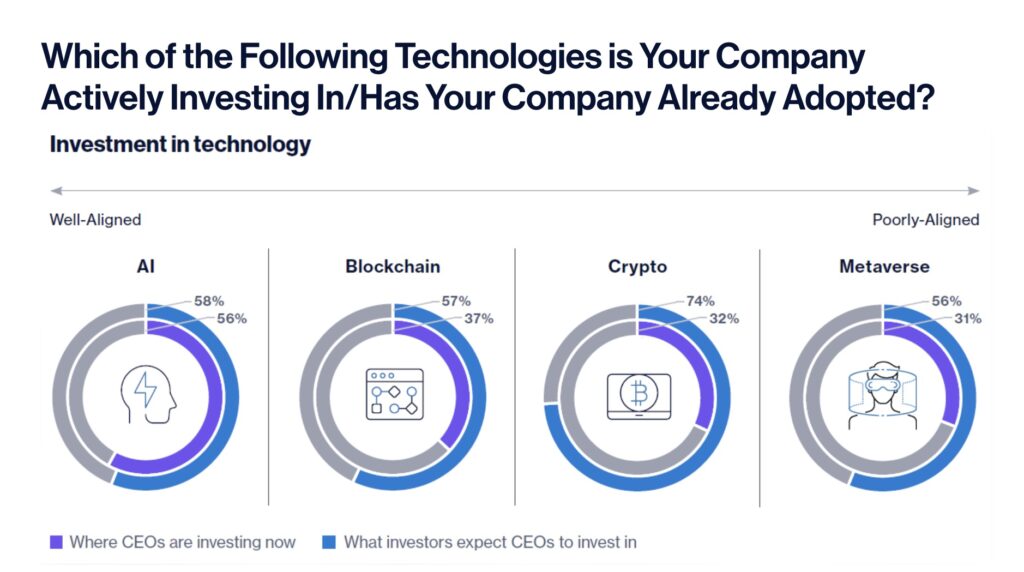The Rise of the AI CEO


Imagine the perfect CEO: Impartial, acting in the best interests of shareholders, employees and the balance sheet. Not biased or compromised by historical baggage, personal relationships or having to worry about their next job. Impervious to emotional manipulation or human error. Sounds impossible. In September, Dictador — a global spirits company — got exactly this type of leader when they placed an AI in the CEO’s chair. (Her name is Mika.)
Teneo’s 2023 global CEO and Investor Outlook Survey demonstrated a resounding interest in the future of AI by CEOs and the investors who empower their agenda as a strong area of big bets for innovative tech. Half (48%) of CEOs from the world’s leading public companies have already adopted AI, with another 58% actively investing to strengthen their AI capabilities.

2023 will see the democratization of artificial intelligence due to Open AI’s ChatGPT and Dall-E – and the race between the likes of Google and Microsoft to develop more powerful and intuitive AIs. These systems have brought the world of frictionless autonomous computing to the masses and are beginning to challenge the fundamental understanding of what computers can do and what it means to create anything, from executive speeches to works of art, from lines of code. The success of these platforms has sparked an arms race with Google, Microsoft and others racing to incorporate or duplicate these technologies within their core products.
It’s by no means perfect though. Try challenging the AI to cite a reference for a research paper or contradict its thinking. You will be met with a groveling and apologetic tone – like all tech, it’s only as good as the human input.
However, it is also introducing efficiencies across the value chain. A recent tech demonstration from Microsoft’s Yusuf Mehdi showed how their new partnership between Open AI and Bing will be able to parse a company’s quarterly earnings report, summarize the important takeaways and even compare key performance numbers against peers – work that would have taken an analyst a few hours, now complete in about 20 seconds.
At what point does the input of AI go beyond workplace efficiencies and help us better understand the psychology of the workforce? Could a well-read AI represent the voice of the employee body at a board level, advocating for employee interests and avoiding the need for lengthy consultation? A devolution of representation to automated standard bearers would be a lot more streamlined. Thinking further, a learned AI trained on how activist investors behave could even act as a “Red Team” for executive teams to stress-test their growth and investment strategies.
Before we fill the boardroom with AIs, it’s worth reminding ourselves that all technology is susceptible to in-built biases. Tech companies ran into trouble using AIs in their hiring process when these systems showed a stark preference for white men, a prejudice rooted in bad training data that enshrined legacy biases in how
the algorithm made decisions. Feeding an AI privileged corporate information would be a risky bet without proprietary knowledge of data processing and handling. As researchers at DeepMind recently put it, “Despite incredible performance in a variety of domains, almost all [AI] systems are completely unable to provide a satisfying answer to the simple question, ‘Why did you do that?’”
The new reality is that AI tools are, and will continue to be, leveraged by individuals in the workplace and academic institutions globally to reduce time spent on tasks. Considering ChatGPT achieved 100 million users in two months, it has been cemented as the fastest growing app of all time. That’s a bell that can’t be unrung.
This underscores the vital need for corporate governance on the usage of AI tools and why board members need to get savvy with this new technology quickly to understand both the corporate opportunities and risks associated with it.
A recent JP Morgan survey4 found more than half of institutional investors see AI having a major influence on how they trade, and 41% of individual investors would make a trade recommended by an AI.
For CEOs, this means understanding that AI is rapidly moving from an efficiency play to an active participant in the market and a stakeholder unto itself. CEOs and their IR teams will need to understand how their messaging will be understood and interpreted by both investors as well as investors’ machines.
Chief Executive Group exists to improve the performance of U.S. CEOs, senior executives and public-company directors, helping you grow your companies, build your communities and strengthen society. Learn more at chiefexecutivegroup.com.
0

1:00 - 5:00 pm
Over 70% of Executives Surveyed Agree: Many Strategic Planning Efforts Lack Systematic Approach Tips for Enhancing Your Strategic Planning Process
Executives expressed frustration with their current strategic planning process. Issues include:
Steve Rutan and Denise Harrison have put together an afternoon workshop that will provide the tools you need to address these concerns. They have worked with hundreds of executives to develop a systematic approach that will enable your team to make better decisions during strategic planning. Steve and Denise will walk you through exercises for prioritizing your lists and steps that will reset and reinvigorate your process. This will be a hands-on workshop that will enable you to think about your business as you use the tools that are being presented. If you are ready for a Strategic Planning tune-up, select this workshop in your registration form. The additional fee of $695 will be added to your total.

2:00 - 5:00 pm
Female leaders face the same issues all leaders do, but they often face additional challenges too. In this peer session, we will facilitate a discussion of best practices and how to overcome common barriers to help women leaders be more effective within and outside their organizations.
Limited space available.

10:30 - 5:00 pm
General’s Retreat at Hermitage Golf Course
Sponsored by UBS
General’s Retreat, built in 1986 with architect Gary Roger Baird, has been voted the “Best Golf Course in Nashville” and is a “must play” when visiting the Nashville, Tennessee area. With the beautiful setting along the Cumberland River, golfers of all capabilities will thoroughly enjoy the golf, scenery and hospitality.
The golf outing fee includes transportation to and from the hotel, greens/cart fees, use of practice facilities, and boxed lunch. The bus will leave the hotel at 10:30 am for a noon shotgun start and return to the hotel after the cocktail reception following the completion of the round.